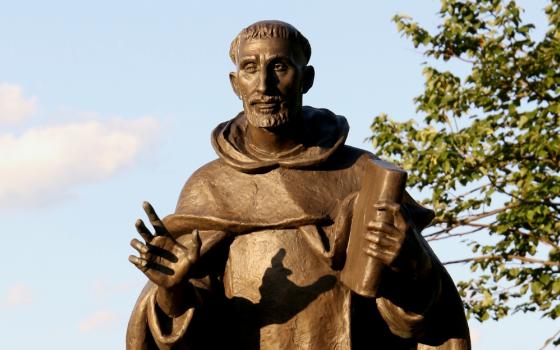Editor's note: This is part of a series of columns by the Dominican Sisters Conference that hopes to open Global Sisters Report's readership to a conversation on truth.
God created the universe and called it "good." God continues to sustain creation, maintaining the relationship between what is made and God's provident plan for it. Even if time before the Fall was a state of perfection, every era — imperfect or not — has been true to God's creative plan. The universe continues to be good. It continues to be truthful as God is truthful.
The founder of the Dominican Order, St. Dominic, understood God's truth both intellectually and at the level of the real life of his day. Both student and activist, he applied study to events going on in his church and world. "Lord, what will become of sinners?" he cried out in prayer.
How could God's truth be expressed in a broken world? Dominic preached truth in his own era, however weakened that era had become by heresy. In southern France, Dominic met an innkeeper, a member of the Albigensian sect. The two men sat up all night, arguing. By morning, the innkeeper gave up his heretical beliefs. We are not told what Dominic said. We do know that details of God's truth touched the innkeeper's heart and mind.
Today is in an era of truth, also. But this era is increasingly brought to the point of destruction by war, hatred and forced migration, as well as by lies, the half-truth and the newly coined "alternative fact." We could say that truth is dead and we are alone to work out some kind of hopeless "post-truth" existence, but we cannot succumb to despair because it can paralyze us. There is much good about our era, and it's worth doing as much as we can to help alleviate the world's untruths.
In meditating on the verse "Mercy and truth have met," Thomas Aquinas said that truth is another word for justice, establishing all things according to God's wisdom. He also said that when directed to others, justice sets up equality among all people.
Is there a link between God's truth and what can be done for our world by means of justice? Does that link suggest how we are to preach in today's troubled world? Looking at the details of truth as it relates to justice might be the link.
To begin with, we can ask ourselves how we pray. Contemplation readies us for serving justly, for assisting those both next to us and a world away, and for preaching the truth — not an easy task.
What do we do after praying, studying and observing the terrifying events of the day? The world's people need words of hope and humanitarian help; they need for us to speak up for international human rights and to urge elected officials to work for justice. We have known all of this for a long time. We have become active in our individual and communal ways, but suffering people are so many. What can we do?
Dominic's optimism strengthened his conviction that teaching the truth and spreading the Gospel in nonviolent ways would win out sooner or later.
We can remember in a fresh way the social activists and inspiring social leaders of our era, like Mahatma Gandhi, Martin Luther King Jr. and Nelson Mandela. Each one of those leaders became famous for spreading the truth. Their nonviolent lives resulted in powerful movements in their respective countries — India, the United States and South Africa — and by extension throughout the world. Their words and actions moved many people to recognize the need for social change.
Another civil rights activist, perhaps less known internationally, was Rosa Parks, an African-American woman and contemporary of King's. She lived in Alabama at the outset of the civil rights movement. By refusing to give up her bus seat to a white man, she proved that a person of color had the same rights as anyone else. She has been called "the first lady of civil rights."
Life wasn't easy for these social activists; death threats and imprisonments hampered their efforts in moving forward. King was assassinated, but not before he had made his mark on the movement he began in the United States. As we reflect on what they accomplished in their own time, we learn details that drove them to act on behalf of justice for all people: details like persistence, deep conviction, and belief in the dignity of the human person.
Seeds planted in the civil rights movement are still germinating; it often takes a long time for untruth to die and truth to grow in its place. Let us not lose hope that one day all people will recognize the truth of equal rights for everyone, everywhere.
There is one more thing that can help us to deepen our sense of truth. Look into the face of a person in need of our prayers and action. Look closely, discover in that face the result of poverty, torture, starvation, illness, despair. Perhaps the person is someone in our midst or homeless in our town, perhaps the face appears in a newspaper photograph: Syrian, Iraqi, Sudanese ...
Look, and see with your heart the pain that has been brought about by the world's untruths.
All our knowledge of how to pray and how to serve others might not be able to help directly or immediately. We might feel frustrated and trapped by our inability to "fix things." But by considering quietly what human suffering really looks like, we can be helped to understand more deeply what we have not experienced directly.
As we walk our shadowed roads toward eternal life, we do whatever we can to alleviate pain caused by untruth. Preaching truth might involve literal words, it might mean action, it might mean studying the great social reformers, or studying faces of suffering people, but we will be impelled to pray more than usual that God's truth in all its details will prevail over the tragedies of our times.
[Marie Sagués is a Dominican sister of San Rafael, California. She teaches English and music history at Dominican University of California. She has also taught basic reading and writing skills to students learning English as a second language.]


